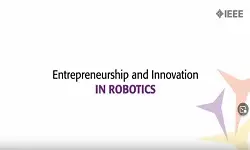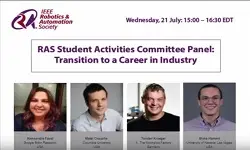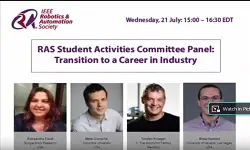-
Members: FreeRAS
IEEE Members: Free
Non-members: FreeLength: 00:54:00
30 May 2017
Video Description
Simple mathematical models of physical systems give us tremendous insight into the nature of their underlying dynamics and the control challenges they present. Stripping away unnecessary details can illuminate fundamental dependencies and focus engineering efforts on the most critical problems. The challenge comes when models become so familiar that they are no longer taken as simplifications but mistaken for reality itself. Opportunities and possibilities that lie outside the bounds of those simple models are subsequently missed.
Ground vehicle dynamics represent an ideal illustration of these principles. While vehicles are complex multi-body systems with uncertain and nonlinear dynamic properties due to tire mechanics, many simplifications of these dynamics exist. By choosing the right level of abstraction for a model, anything from parallel parking to a race car driver’s choice of trajectory to drifting with smoking rear tires can be explained clearly and concisely. The choice of model is important, however, since what one model illuminates, another may obscure. This talk demonstrates through mathematics and video from experiments how simple models can be used to accurately control automated vehicles through even the most extreme maneuvers on the race track. Lap times comparable to expert drivers and drifting maneuvers beyond the precision of a human are possible with models consisting of only a few state variables.
Just as models can guide or limit us in our work as researchers and engineers, our models of what it means to be a researcher or academic can sometimes artificially limit our impact in the world. The talk concludes with some simple models of how the robotics community can provide necessary leadership and technical guidance as society wrestles with the changes arising from our technologies.
ICRA 2017
The 2017 IEEE International Conference on Robotics and Automation (ICRA) was held from May 29 to June 3, 2017 at Sands Expo and Convention Centre, Marina Bay Sands in Singapore. ICRA is IEEE Robotics and Automation Society's flagship conference and is a premier international forum for robotics researchers to present their work. The conference theme, “Innovation, Entrepreneurship, and Real-world Solutions”, underscores the need for innovative R&D talent, dynamic and goal-driven entrepreneurs and practitioners using robotics and automation technology to solve challenging real-world problems such as shortage of labour, an ageing society, and creating sustainable environments.
Speaker
Chris Gerdes is a Professor of Mechanical Engineering and, by courtesy, of Aeronautics and Astronautics at Stanford University. His laboratory studies how cars move, how humans drive cars and how to design future cars that work cooperatively with the driver or drive themselves. When not teaching on campus, he can often be found at the racetrack with students, instrumenting historic race cars or trying out their latest prototypes for the future. Vehicles in the lab include X1, an entirely student-built test vehicle; Shelley, an automated Audi TT-S that can lap a racetrack as quickly as an expert driver; and MARTY, an electrified DeLorean capable of controlled drifts. Chris and his team have been recognized with a number of awards including the Presidential Early Career Award for Scientists and Engineers, the Ralph Teetor award from SAE International and the Rudolf Kalman Award from the American Society of Mechanical Engineers.
From February 2016 to January 2017, Chris served as the first Chief Innovation Officer at the United States Department of Transportation. In this role, he worked with Secretary Anthony Foxx to foster the culture of innovation across the department and find ways to support transportation innovation taking place both inside and outside of government. He was part of the team that developed the Federal Automated Vehicles Policy and represented the Department on the National Science and Technology Committee Subcommittee on Machine Learning and Artificial Intelligence. He continues to serve U.S. DOT as Vice Chair of the Federal Advisory Committee on Automation in Transportation.
Chris is a co-founder of truck platooning company Peloton Technology and served as Peloton’s Principal Scientist before joining U.S. DOT.
Simple mathematical models of physical systems give us tremendous insight into the nature of their underlying dynamics and the control challenges they present. Stripping away unnecessary details can illuminate fundamental dependencies and focus engineering efforts on the most critical problems. The challenge comes when models become so familiar that they are no longer taken as simplifications but mistaken for reality itself. Opportunities and possibilities that lie outside the bounds of those simple models are subsequently missed.
Ground vehicle dynamics represent an ideal illustration of these principles. While vehicles are complex multi-body systems with uncertain and nonlinear dynamic properties due to tire mechanics, many simplifications of these dynamics exist. By choosing the right level of abstraction for a model, anything from parallel parking to a race car driver’s choice of trajectory to drifting with smoking rear tires can be explained clearly and concisely. The choice of model is important, however, since what one model illuminates, another may obscure. This talk demonstrates through mathematics and video from experiments how simple models can be used to accurately control automated vehicles through even the most extreme maneuvers on the race track. Lap times comparable to expert drivers and drifting maneuvers beyond the precision of a human are possible with models consisting of only a few state variables.
Just as models can guide or limit us in our work as researchers and engineers, our models of what it means to be a researcher or academic can sometimes artificially limit our impact in the world. The talk concludes with some simple models of how the robotics community can provide necessary leadership and technical guidance as society wrestles with the changes arising from our technologies.
ICRA 2017
The 2017 IEEE International Conference on Robotics and Automation (ICRA) was held from May 29 to June 3, 2017 at Sands Expo and Convention Centre, Marina Bay Sands in Singapore. ICRA is IEEE Robotics and Automation Society's flagship conference and is a premier international forum for robotics researchers to present their work. The conference theme, “Innovation, Entrepreneurship, and Real-world Solutions”, underscores the need for innovative R&D talent, dynamic and goal-driven entrepreneurs and practitioners using robotics and automation technology to solve challenging real-world problems such as shortage of labour, an ageing society, and creating sustainable environments.
Speaker
Chris Gerdes is a Professor of Mechanical Engineering and, by courtesy, of Aeronautics and Astronautics at Stanford University. His laboratory studies how cars move, how humans drive cars and how to design future cars that work cooperatively with the driver or drive themselves. When not teaching on campus, he can often be found at the racetrack with students, instrumenting historic race cars or trying out their latest prototypes for the future. Vehicles in the lab include X1, an entirely student-built test vehicle; Shelley, an automated Audi TT-S that can lap a racetrack as quickly as an expert driver; and MARTY, an electrified DeLorean capable of controlled drifts. Chris and his team have been recognized with a number of awards including the Presidential Early Career Award for Scientists and Engineers, the Ralph Teetor award from SAE International and the Rudolf Kalman Award from the American Society of Mechanical Engineers.
From February 2016 to January 2017, Chris served as the first Chief Innovation Officer at the United States Department of Transportation. In this role, he worked with Secretary Anthony Foxx to foster the culture of innovation across the department and find ways to support transportation innovation taking place both inside and outside of government. He was part of the team that developed the Federal Automated Vehicles Policy and represented the Department on the National Science and Technology Committee Subcommittee on Machine Learning and Artificial Intelligence. He continues to serve U.S. DOT as Vice Chair of the Federal Advisory Committee on Automation in Transportation.
Chris is a co-founder of truck platooning company Peloton Technology and served as Peloton’s Principal Scientist before joining U.S. DOT.


